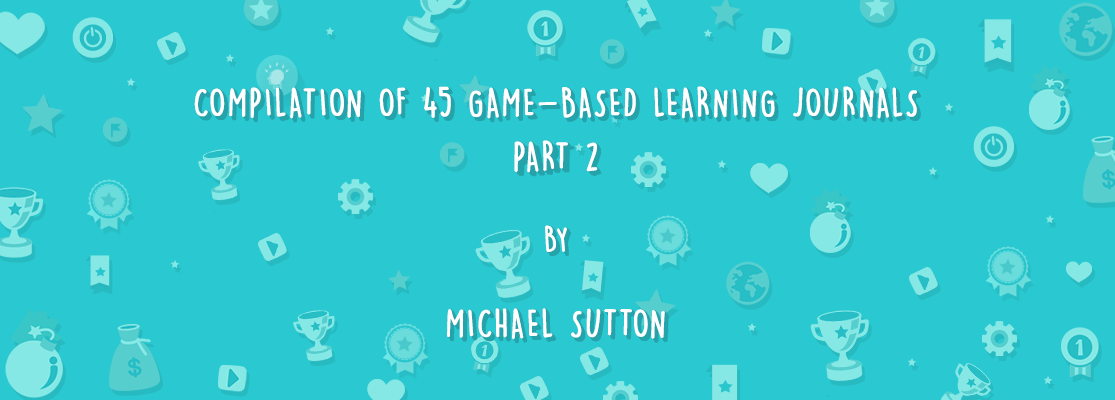COMPILATION OF 45 GAME-BASED LEARNING JOURNALS: PART 2
Information Sources for the Topics of Game-Based Learning, Simulations, Serious Games, Gamification, Virtual Reality, and Immersive Learning.
This Part 2 continues from the previous post.
JOURNAL TITLE LIST
- IEEE TRANSACTIONS ON COMPUTATIONAL INTELLIGENCE AND AI IN GAMES
- INTERNATIONAL COMPUTER GAMES ASSOCIATION
- INTERNATIONAL JOURNAL OF COMPUTER GAME DEVELOPMENT AND EDUCATION (CGDEIJ)
- INTERNATIONAL JOURNAL OF COMPUTER GAMES TECHNOLOGY
- INTERNATIONAL JOURNAL OF EDUCATIONAL TECHNOLOGY IN HIGHER EDUCATION
- INTERNATIONAL JOURNAL OF GAME-BASED LEARNING
- INTERNATIONAL JOURNAL OF GAME THEORY AND TECHNOLOGY (IJGTT)
- INTERNATIONAL JOURNAL OF GAMING AND COMPUTER-MEDIATED SIMULATIONS (IJGCMS)
- INTERNATIONAL JOURNAL OF INTERACTIVE WORLDS (IJIW)
- INTERNATIONAL JOURNAL OF PLAY
- INTERNATIONAL JOURNAL OF ROLE-PLAYING
- INTERNATIONAL JOURNAL OF SERIOUS GAMES
- INTERNATIONAL JOURNAL OF VIRTUAL REALITY
- INTERNATIONAL JOURNAL OF VIRTUAL AND AUGMENTED REALITY (IJVAR)
JOURNAL DETAILS
IEEE TRANSACTIONS ON COMPUTATIONAL INTELLIGENCE AND AI IN GAMES
http://ieeexplore.ieee.org/xpl/RecentIssue.jsp?punumber=4804728
Description
The IEEE Transactions on Computational Intelligence and AI in Games (T-CIAIG) publishes archival journal quality original papers in computational intelligence and related areas in artificial intelligence applied to games, including but not limited to videogames, mathematical games, human–computer interactions in games, and games involving physical objects. Emphasis is placed on the use of these methods to improve performance in and understanding of the dynamics of games, as well as gaining insight into the properties of the methods as applied to games. It also includes using games as a platform for building intelligent embedded agents for the real world. Papers connecting games to all areas of computational intelligence and traditional AI are considered.
INTERNATIONAL COMPUTER GAMES ASSOCIATION
https://icga.leidenuniv.nl/
Description
The International Computer Games Association (ICGA) is a global organisation promoting the use of computers in “game” situations. The ICGA contributes to the experience of game- and computer-game playing in the widest sense through education, entertainment and academic research in Artificial Intelligence. The aims are:
- To promote the demonstration of Artificial Intelligence via the domain of computer games
- To foster the community of those interested in the theory and practice of computer gaming
- To promote competition in games that include computer involvement
- To add value, by education and entertainment, to the human experience of game-playing
Games have historically been a major part of the world’s cultures, perhaps initially as a way of modelling some aspect of society in a simple and safe way. Today, computer technology is a key force for change: computer game-playing combines these two elements of the world. Computer involvement in game- and model-domains will continue to add value to the human enjoyment of them, as well as creating knowledge and AI techniques which can be used more widely in important areas where complex search is involved. The ICGA contributes by promoting this activity and the members have included many leading figures in Computer Science.
The scope of the games domains now includes not only discrete, 2-person, board games of no chance and perfect information, but also games that are non-discrete, games that involve chance, imperfect information or negotiation, as well as management games and games such as snooker and soccer that have a strategy element. In fact, any “game” in the widest sense of the word, provided always that some strategy is required to play the game well. We intend to explore all of these games and more, to introduce them in the journal, on the web site and at the conferences, and to organize tournaments for them.
INTERNATIONAL JOURNAL OF COMPUTER GAME DEVELOPMENT AND EDUCATION (CGDEIJ)
http://airccse.org/journal/ijcgde/
Description
Video games continue to open new frontiers in entertainment as well as more serious computing. The academic and industrial interest in the design, development, and education of video games has been witnessing an ever-increasing growth and this trend is expected to continue. The aim of this journal is to bring out the latest developments in all aspects of video game development and education in a timely manner.
- Game design (scripts, arts & crafts, gameplay, animation, motion capture, interface)
- Game engine (architecture, algorithms, and other implementation issues)
- Physics based modeling in a video game
- Optimization issues in a video game
- Testing and testability issues in video game development
- Software engineering issues in video game development
- Learning and adaptability issues in a video game
- Serious games (creation, deployment, and usage for training)
- Education and curriculum issues related to video game
- Impact of video game on well-being of society as well as adverse effects
- All aspects of entertainment computing and edutainment
INTERNATIONAL JOURNAL OF COMPUTER GAMES TECHNOLOGY
https://www.hindawi.com/journals/ijcgt/
Description
International Journal of Computer Games Technology is a peer-reviewed, open access journal that publishes original research and review articles on both the research and development aspects of games technology covering the whole range of entertainment computing and interactive digital media.
INTERNATIONAL JOURNAL OF EDUCATIONAL TECHNOLOGY IN HIGHER EDUCATION
https://educationaltechnologyjournal.springeropen.com/about
Description
This journal aims to: provide a vehicle for scholarly presentation and exchange of information between professionals, researchers and practitioners in the technology-enhanced education field; contribute to the advancement of scientific knowledge regarding the use of technology and computers in higher education; and inform readers about the latest developments in the application of information technologies (ITs) in higher education learning, training, research and management.
The journal welcomes research on innovative approaches in applying technology to enhance learning, design and educational outcomes, including quantitative, qualitative and hybrid approaches. Articles on applied theory in educational practice are also welcomed, as well as articles on the practical applications of research, on current policy initiatives and evaluations of research, theoretical, pedagogical and methodological issues related to educational technology. In addition, the journal accepts critical reviews on theoretical or pedagogical perspectives, new technologies and the use of IT in higher education.
Authors are encouraged to submit papers related, but not limited, to the following topics of interest:
- Innovations and best practices in online learning, training, research and management
- Educational technology, models and trends in higher education
- Computer-supported collaborative learning, training and research
- Intelligent tutoring and mentoring systems
- Learning analytics and educational data mining
- Open access systems for learning and training
- Organisational and administrative perspectives of IT use in higher education
- University governance and leadership in the knowledge society
- Institutional policies, standards and assessment methods
- Models of higher education presence and service using the Internet
- Internationalization and cultural aspects of online learning, training and research
INTERNATIONAL JOURNAL OF GAME-BASED LEARNING
http://www.igi-global.com/journal/international-journal-game-based-learning/41019
Description
The International Journal of Game-Based Learning (IJGBL) is devoted to the theoretical and empirical understanding of game-based learning. To achieve this aim, the journal publishes theoretical manuscripts, empirical studies, and literature reviews. The journal publishes this multidisciplinary research from fields that explore the cognitive and psychological aspects that underpin successful educational video games. The target audience of the journal is composed of professionals and researchers working in the fields of educational games development, e-learning, technology-enhanced education, multimedia, educational psychology, and information technology. IJGBL promotes an in-depth understanding of the multiple factors and challenges inherent to the design and integration of Game-Based Learning environments.
Topics Covered
- Adaptive games design for Game-Based Learning
- Design of educational games for people with disabilities
- Educational video games and learning management systems
- Game design models and design patterns for Game-Based Learning
- Instructional design for Game-Based Learning
- Integration and deployment of video games in the classroom
- Intelligent tutoring systems and Game-Based Learning
- Learning by designing and developing video games
- Learning styles, behaviors and personalities in educational video games
- Mobile development and augmented reality for Game-Based Learning
- Motivation, audio and emotions in educational video games
- Role of instructors
- Virtual worlds and Game-Based Learning
Mission
The mission of the International Journal of Game-Based Learning (IJGBL) is to promote knowledge pertinent to the design of Game-Based Learning environments, and to provide relevant theoretical frameworks and the latest empirical research findings in the field of Game-Based Learning. The main goals of IJGBL are to identify, explain, and improve the interaction between learning outcomes and motivation in video games, and to promote best practices for the integration of video games in instructional settings. The journal is multidisciplinary and addresses cognitive, psychological and emotional aspects of Game-Based Learning. It discusses innovative and cost-effective Game-Based Learning solutions. It also provides students, researchers, instructors, and policymakers with valuable information in Game-Based Learning, and increases their understanding of the process of designing, developing and deploying successful educational games. IJGBL also identifies future directions in this new educational medium.
INTERNATIONAL JOURNAL OF GAME THEORY AND TECHNOLOGY (IJGTT)
http://airccse.org/journal/ijgtt/
Description
International Journal of Game Theory and Technology (IJGTT) is an open access peer -reviewed journal that helps bridge together both the research and development aspects of games theory and technology. Game theory is an inter-disciplinary field that focuses on studying games, creating innovative architectures and explores new ideas to develop games which can be used for learning purposes. This journal provides a platform for exchanging ideas in new emerging trends that needs more focus and exposure and will attempt to publish proposals that strengthen the goals. Topics of interest include, but are not limited to the following:
- Architectures
- Decision- Making
- Current problems and novel solutions
- Dynamic game play generation
- Sharing and re-use of AI systems
- Multiple agent behavior
- Modeling Players strategies
- Social Learning and Video Games
- Dynamic game play
- Design models and patterns for Game-Based Learning
- Natural Language Interaction
- Game-Based Learning Technologies
- Games for Special Needs Education
- Motivation-driven educational games designs
- Video games and learning management systems
- Production and deployment of video games as learning tools
- Augmented reality games
- Developing novel video games
- Game-based tutoring system
- Simulation and Game-based learning
- Virtual worlds and Game-Based Learning
- Mobile game-based learning evaluation
- Embedding instructional design principles in games
INTERNATIONAL JOURNAL OF GAMING AND COMPUTER-MEDIATED SIMULATIONS (IJGCMS)
http://www.igi-global.com/journal/international-journal-gaming-computer-mediated/1125
Description
The International Journal of Gaming and Computer-Mediated Simulations (IJGCMS) is a peer-reviewed, international journal devoted to the theoretical and empirical understanding of electronic games and computer-mediated simulations. The journal is interdisciplinary in nature; it publishes research from fields and disciplines that share the goal of improving the foundational knowledge base of games and simulations. The journal publishes critical theoretical manuscripts as well as qualitative and quantitative research studies, meta-analyses, and methodologically-sound case studies. The journal also includes book reviews to keep readers on the forefront of this continuously evolving field. Occasional special issues from the journal provide deeper investigation into areas of interest within either gaming or simulations.
Topics Covered
- Cognitive, social, and emotional impact of games and simulations
- Critical reviews and meta-analyses of existing game and simulation literature
- Current and future trends, technologies, and strategies related to game, simulation development, and implementation
- Electronic games and simulations in government, business, and the workforce
- Electronic games and simulations in teaching and learning
- Frameworks to understand the societal and cultural impacts of games and simulations
- Impact of game and simulation development use on race and gender game and simulation design
- Innovative and current research methods and methodologies to study electronic games and simulations
- Psychological aspects of gaming
- Teaching of games and simulations at multiple age and grade levels
Mission
The International Journal of Gaming and Computer-Mediated Simulations (IJGCMS) publishes research articles, theoretical critiques, and book reviews related to the development and evaluation of games and computer-mediated simulations. One main goal of this peer-reviewed, international journal is to promote a deep conceptual and empirical understanding of the roles of electronic games and computer-mediated simulations across multiple disciplines. A second goal is to help build a significant bridge between research and practice on electronic gaming and simulations, supporting the work of researchers, practitioners, and policymakers.
INTERNATIONAL JOURNAL OF INTERACTIVE WORLDS (IJIW)
http://ibimapublishing.com/journals/international-journal-of-interactive-worlds/
Description
The aim of the International Journal of Interactive Worlds (IJIW) is to disseminate research conducted in the area of Interactive Worlds and its related domains. Ranging from mobile devices that augment the real world to the virtual environments of simulations and computer games, Interactive Worlds have established themselves as elements of everyday life.
Due to the multidisciplinary nature of this area the Journal will welcome submissions covering a wide range of topics. The emphasis will be on the publication of high quality articles, from descriptions of specific algorithms to full system implementations, rapidly and freely available to researchers, practitioners and decision makers worldwide. The journal will also organise regular special issues, as well as accept state of the art reports and communications.
INTERNATIONAL JOURNAL OF PLAY
http://www.tandfonline.com/loi/rijp20
Description
The International Journal of Play is an inter-disciplinary publication focusing on all facets of play. It aims to provide an international forum for mono- and multi-disciplinary papers and scholarly debate on all aspects of play theory, policy and practice from across the globe and across the lifespan, and in all kinds of cultural settings, institutions and communities. The journal will be of interest to anthropologists, educationalists, folklorists, historians, linguists, philosophers, playworkers, psychologists, sociologists, therapists and zoologists.
The journal welcomes:
- Reports on research projects
- Review work across an area of research
- Papers concerned with theory-practice links
- Policy critiques and expositions
- Reviews and analysis of contemporary and historical publications
- Essays, memoirs, and other forms of reflective writing
- Writing that builds on the experience and voices of children and young people
- Theoretical position papers
INTERNATIONAL JOURNAL OF ROLE-PLAYING
http://ijrp.subcultures.nl/?page_id=2
Description
The aim of The International Journal of Role-Playing is to act as a hybrid knowledge network, and bring together the varied interests in role-playing and the associated knowledge networks, e.g. academic research, the games and creative industries, the arts and the strong role-playing communities.
The International Journal of Role-Playing is a response to a growing need for a place where the various fields of role-playing research and development, covering academia, the games industry, the arts and the strong non-academic role-playing communities that exist worldwide, can exchange knowledge and research, form networks and communicate.
Since the release of D&D in 1974 Fantasy role-playing games in its many incarnations (tabletop, LARP, MUD and MMORPGs, mixed reality role-playing games) became an important cultural phenomenon in Europe, America, Asia and Australia. Over the last years role-playing-focused (or related) studies and development projects are increasingly common in the games studies field, in game development and outside these two areas. Role-play is a much broader concept than Fantasy role-play, which means we can also find role-play and role-play research in the context of theatre, interactive storytelling, therapy, education, training etc.
INTERNATIONAL JOURNAL OF SERIOUS GAMES
http://journal.seriousgamessociety.org/index.php?journal=IJSG
Description
The International Journal of Serious Games (IJSG) publishes original papers of significant and lasting value in all areas related to design, development, deployment and assessment of digital Serious Games (SGs). The journal encourages submission of manuscripts that enhance the theoretical foundations of game-based learning and SG design, show innovative technological solutions aimed to improve teaching and learning, and/or provide user studies about deployment of SGs in educational or corporate training settings. Papers investigating business/product analysis and market penetration are welcome as well.
All papers should advance the state of the art in the relevant area. Empirical studies are strongly encouraged. Papers may be one of several types: research paper; tutorial/survey; research note/short paper; software/algorithms; addendum/corrections; datasets.
INTERNATIONAL JOURNAL OF VIRTUAL REALITY
http://www.ijvr.org/web/platform/home
Description
The International Journal of Virtual Reality (IJVR) is a professional journal dedicated to the promotion and publication of new research and technology in the realm of Virtual Reality. The information regarding this new and constantly emerging technology is of interest to computer media professionals worldwide as well as others interested in the expanding potential of virtual reality. The journal has been published since 1995 when virtual reality was still in its infancy.
International Journal of Virtual Reality solicits contributions describing original research results, applications, and experience in all fields of Virtual Reality.
INTERNATIONAL JOURNAL OF VIRTUAL AND AUGMENTED REALITY (IJVAR)
http://www.igi-global.com/journal/international-journal-virtual-augmented-reality/145080
Description
The International Journal of Virtual and Augmented Reality (IJVAR) presents interdisciplinary research on the technological, social, legal, and policy implications of virtual and mixed reality integration and how the division between real and virtual worlds is becoming less distinct. Fostering interdisciplinary applied research and a unique forum for novel solutions for virtual immersion and mixed reality, the articles found within IJVAR are essential to the research needs of graduate-level students, researchers, and professionals interested in topics relevant to the digitization of everyday life.
Topics Covered
- 3D Interactive Graphics
- Collaborative Environments
- Computer Simulation
- Computer Vision
- Gamification
- Human-Computer Interaction
- Immersive Technologies
- Mixed Reality
- Multimedia Technologies
- Multimodal Devices
- Serious Games
- Smart Environments
- Sound Spatialization
- Spatial Positioning
- Virtual Worlds
Mission
The International Journal of Virtual and Augmented Reality (IJVAR) aims to present the latest research on mediated reality tools, applications, and implementation. Approaching the topic of virtual immersion from a variety of viewpoints across industries, IJVAR strives to be an essential reference source for professionals, researchers, and graduate students engaged in research in the areas of computational intelligence, gaming, digitization, computer-generated sensory, virtual environments, and human-computer interaction.
Part 2 of the compiled list ends here. Given below are links to other posts in this series:
Original Date of Publication: December 30, 2016
Publisher: FUNIFICATION LLC, Boise, ID, USA
Copyright © 2016, Michael Sutton (except for website excerpts of journal descriptions)
Written by Michael Sutton
_________________________________
Published on 17-Jan-2017






